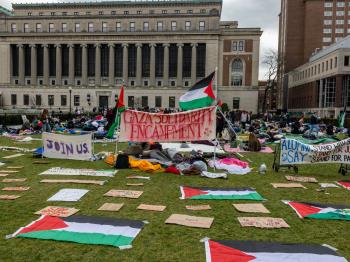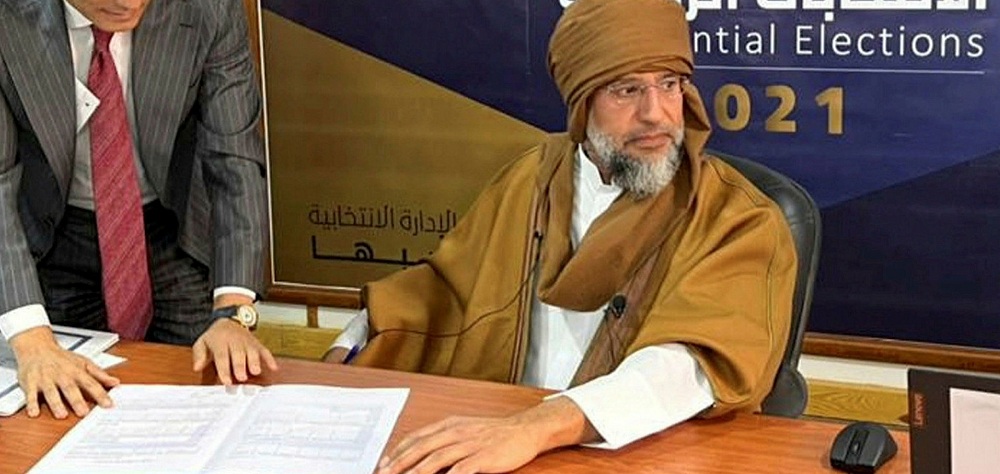Alwaght- On Wednesday, Libyan election commission in a controversial decision disqualified Saif Al-Islam Gaddafi, the son of former ruler Muammar Gaddafi, for presidential candidacy, less than a month to the first round of election. The move has concerned leaders of various countries about eruption of a new wave of civil war in the country.
The first round of the election is planned for December 24 and the second round for about a month later. The concerns about outbreak of fresh clashes following Gaddafi disqualification come as on November 3 France held a conference on security and government in Libya attended by the officials of countries with influence in the North African country including the US, Germany, Italy, Egypt, Russia, the UAE, and Saudi Arabia. The key outcome of the meeting was an agreement to support secure and healthy elections in Libya.
At the conference, participants stressed the need to hold elections on time, full respect for Libya's sovereignty, independence, territorial integrity, and national unity, as well as opposition to any foreign interference in the country's affairs. However, the unfavorable conditions for vote, as well as the conditions after the announcement of the results, compose the major concerns that political observers continue to warn against. In the midst of this difficult situation, the commission's decision to remove Saif al-Islam Gaddafi from the list of candidates has raised concerns more than ever about reviving the internal crisis.
A question: What challenges can Libya face during the election and after announcement of the results?
Risk of return to civil war
The decision by the election commission has proven worrisome to home and foreign actors. The head of the Presidential Council Mohammad al-Menfi, for example, at the National Youth Conference in Tripoli said that the council was worried about the risk of the country sliding back into the civil war and called for peaceful political rivalry. The US Secretary of State Antony Blinken and the Russian Foreign Minister Sergei Lavrov had expressed their concerns about the consequences of the election commission's decision. Actually, not only there are risks of pre-election clashes but also post-election fight can break out.
Libyan leadership body rocked by serious tensions
Talking about the rules of the democratic political game, holding the elections, and accepting the results by various political currents comes while the country in all the years after 2011 has been in a widespread crisis and was divided into two parts one in the east and the other in the west. Differences started in the Libyan leadership body less than five years after a violent revolution that toppled Muammar Gaddafi. These differences shaped two governments: Government of National Accord (GNA) which was UN-recognized and Libya National Army (LNA) led by warlord Khalifa Haftar in eastern Libya. The southwest is held by Tawariq tribes and in the Haftar-controlled areas Toubou tribes are leading. Also, a large part of the north is held by ISIS-aligned groups.
Concerning holding the presidential election and accepting its results, the potential threat is tensions between the two main power poles. The new leadership body was shaped by talks between them from October to November last year.
As a result of these negotiations, the two main rival groups in the Libyan civil war on June 5, 2020, finally agreed to form a new transitional government. The agreement followed five days of negotiations at a UN-coordinated meeting in Geneva that resulted in the election of al-Menfi as the new chairman of the Presidential Council and Abdul Hamid Dabibeh as prime Minister.
In recent months, tensions between al-Manfi and Dabibeh have risen about holding elections on time. Al-Menfi's circle says holding elections is not logical until Libyan rule is restored, and it will be impossible to achieve it until the mercenaries leave the country. Libya also has no election law, while less than a month is left to the election. The Tobruk-based parliament passed an election law on October 4, but was rejected by Tripoli the next day. During his speech at the Paris conference, Dabibeh called on the lawmakers to revise the election law to secure justice, inclusion, and equal opportunities.
Foreign interference continues
Another issue Libya is struggling with is foreign interference that has its effects in pre-election stage. Paris conference made it crystal clear that leaders and officials of around 30 countries are making decisions about Libya future. Turkey and Russia, supporting the opposite sides of Libyan conflict, have a large number of mercenaries. Turkey did not take part. Others like the UAE, Egypt, France, and Saudi Arabia find themselves involved in the Libyan political future. Disputes are predicted to continue among all these actors upon the election end. In other words, victory of each party aligned with each of these sides can trigger foreign opposition and meddling.



























